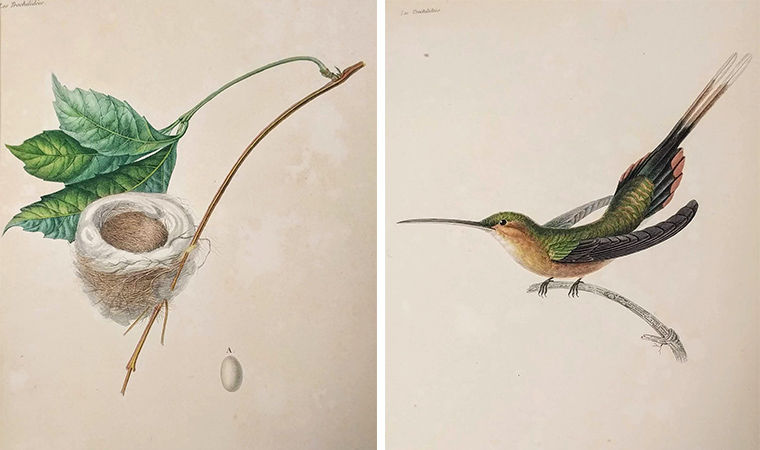Ludwig Hölty’s poetry involves sensitive responses to the sounds and sights in the woods and groves of the region around Hannover and Göttingen, particularly in the month of May. The youthful voice of love and longing is tinged with a profound sadness and melancholy, since the evidence of exuberant and successful coupling taking place in nature only serves to accentuate the poet’s isolation. He hears nightingales, and can only imagine the reticent females waiting for their eloquent partners in their hidden nests.
Wann der silberne Mond durch die Gesträuche blinkt,
Und sein schlummerndes Licht über den Rasen streut,
Und die Nachtigall flötet,
Wandl' ich traurig von Busch zu Busch.
Selig preis ich dich dann, flötende Nachtigall,
Weil dein Weibchen mit dir wohnet in einem Nest,
Ihrem singenden Gatten
Tausend trauliche Küsse gibt.
Whenever the silver moon gleams through the undergrowth
And strews its slumbering light over the grass,
And the nightingale sings like a flute,
I wander sadly from bush to bush.
On those occasions I consider you blessed, fluting nightingale,
Since your little wife lives with you in one nest,
To her singing spouse
She gives a thousand cosy kisses.
Ludwig Christoph Heinrich Hölty, Die Mainacht D 194
Geuß nicht so laut der liebentflammten Lieder
Tonreichen Schall
Vom Blütenast des Apfelbaums hernieder,
O Nachtigall!
Du tönest mir mit deiner süßen Kehle
Die Liebe wach;
Denn schon durchbebt die Tiefen meiner Seele
Dein schmelzend Ach!
Dann flieht der Schlaf von neuem dieses Lager,
Ich starre dann,
Mit nassem Blick, und totenbleich und hager
Den Himmel an.
Fleuch Nachtigall, in grüne Finsternisse,
Ins Haingesträuch,
Und spend im Nest der treuen Gattin Küsse;
Entfleuch, entfleuch!
Do not pour them out so loudly those songs that are aflame with love
Making such a musically rich sound
As they come down from the blossoming branch of the apple tree,
Oh nightingale.
With your sweet throat you are striking a chord in me,
Awakening love,
Since a tremor is already rumbling through the depths of my soul:
Your melting 'Ah'.
Then yet again sleep flees from this bed,
I then gaze
With a damp look, pale as death and gaunt,
Staring at the sky.
Flee, nightingale, into the green darkness,
Into the undergrowth of the grove,
And in your faithful spouse's nest offer kisses,
Fly off, fly off!
Ludwig Christoph Heinrich Hölty, ed. Johann Heinrich Voß, An die Nachtigall D 196
The nests in these poems are clearly a human projection of an ideal home and have little to do with observation of avian life. The poet, despite his uxorious language, never married. At the age of 20 he fell in love with Anna Juliane Hagemann, but his passion was unreciprocated and she married someone else.
This rejection perhaps echoed and recapitulated his childhood experience of forced isolation. After surviving smallpox at the age of 9 Hölty was seriously disfigured and when his mother died of tuberculosis around the same time he retreated into the world of books. We can perhaps imagine why ‘nests’ began to take on such significance in his work.
☙
Descendant of:
AnimalsTexts with this theme:
- Ammenlied, D 122 (Michael Lubi)
- Die Mainacht, D 194 (Ludwig Christoph Heinrich Hölty)
- An die Nachtigall (Geuß nicht so laut), D 196 (Ludwig Christoph Heinrich Hölty and Johann Heinrich Voß)
- Winterlied, D 401 (Ludwig Christoph Heinrich Hölty)
- Die frühe Liebe, D 430 (Ludwig Christoph Heinrich Hölty)
- Morgenlied (Eh die Sonne früh aufersteht), D 685 (Friedrich Ludwig Zacharias Werner)
- Viola, D 786 (Franz Adolph Friedrich von Schober)


